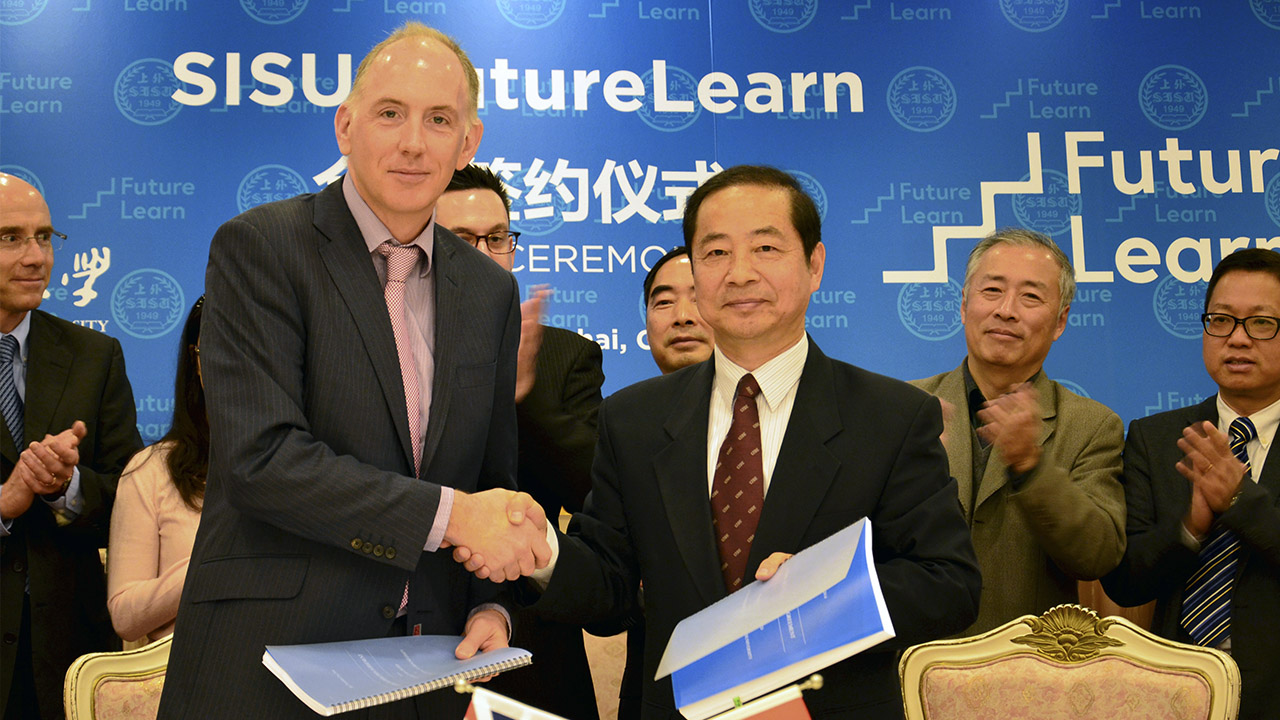| F |
utureLearn, the UK-based social learning platform, has today partnered with Shanghai International Studies University (SISU), a global centre of excellence in foreign language teaching.
SISU becomes the latest leading Chinese university to join the social learning platform, with the aim of creating high quality educational experiences for FutureLearn’s worldwide community of learners through massive open online courses (MOOCs). SISU joins the growing number of prestigious higher and specialist education institutions offering free online courses on futurelearn.com, together with world-renowned cultural bodies like the British Council, British Library and British Museum.
A signing ceremony to seal the partnership took place in Shanghai this morning (Friday 21st November), attended by Professor Cao Deming, President of SISU and Simon Nelson, Chief Executive of FutureLearn.
Speaking of the new partnership, President Cao said, “SISU is glad to join the FutureLearn community. Drawing on our strengths in multilingual and multicultural studies, SISU looks forward to bringing our high-quality courses to learners around the world. This partnership will provide worldwide learners with easier access to oriental thought and wisdom, as well as enable Chinese students to enjoy the diversity of global learning resources on this online platform. This partnership will serve as a bridge between Chinese and world culture and a positive step towards more international resources for FutureLearn.”
Simon Nelson said: “I am delighted to welcome Shanghai International Studies University to the FutureLearn partnership, not only as a positive step towards creating links between Chinese and international students, but for the innovations in teaching language, culture and literature that SISU will bring to our global community of learners. I am pleased that FutureLearn can act as a conduit to take SISU’s brand and expertise to a worldwide audience.”
President Cao shared SISU’s strategic plan of furthering this partnership, “SISU aims to bring more vitality to the world with competitive young talents, high scientific research level and high-quality online courses.”
In response to President Cao’s ambition, Simon Nelson promised FutureLearn would send more key people to China with assured support for SISU regarding product designing, marketing strategy, staff training and technical revolution.
The signing ceremony was followed by a presentation by Chi Ruobin, who introduced to the important members SISU’s first upcoming online course - Intercultural Communication Theory and Practice. This 10-week course is designed for both Chinese and international students to gain a better understanding of communications in a global context.
The ceremony was ended by a promising prospect outlined by Matt Courtney of British Council. He said a campaign called Generation UK had been undergoing, intended to send more young British to China by 2020. President Cao believed this campaign would surely be a success since SISU’s online courses would definitely make great contributions to attracting British students to China.
SISU joins a growing number of Chinese universities signing up to offer free online courses on FutureLearn. In June this year, Fudan University and Shanghai Jiao Tong University become the first institutions from China to partner with FutureLearn, with agreements signed as part of the China-UK Prime Ministerial summit in London, attended by Chinese Premier Li Keqiang and British Prime Minister David Cameron.
FutureLearn is wholly owned by The Open University, a world leader in distance and online learning with more than 44 years of experience. The website went live in September 2013 following the rapid development of MOOCs in the global higher education sector. FutureLearn currently reaches close to 750,000 learners in more than 190 countries and territories around the world, studying more that 1.5 million courses between them.




